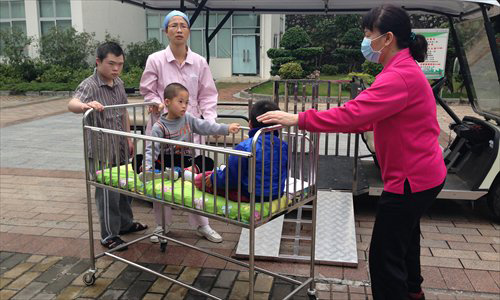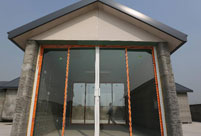 Cherry blossoms reach peak bloom in Washington D.C.
Cherry blossoms reach peak bloom in Washington D.C.
 Top Chinese fashion icons in foreigners' eyes
Top Chinese fashion icons in foreigners' eyes
 Asia's largest business aviation exhibition to be held in Shanghai
Asia's largest business aviation exhibition to be held in Shanghai
 World's top-rated luxury hotels
World's top-rated luxury hotels
 Wu Jing, Xie Nan to hold wedding on May
Wu Jing, Xie Nan to hold wedding on May
 London Cake International attracts tourists
London Cake International attracts tourists
 Let's dance in harmonic Shaanxi
Let's dance in harmonic Shaanxi
 Christie's to auction dazzling diamonds
Christie's to auction dazzling diamonds
 'Model husband' shatters image of love
'Model husband' shatters image of love
 Can animals smile? Or put on a happy face
Can animals smile? Or put on a happy face
 |
| Caretakers transport the homeless children in the Guangzhou welfare house in late March.(Liang Chen/GT) |
Li Li (pseudonym) was 1-month-old when it became clear she suffered from a cleft palate and deformed legs.
After her parents, who are both migrant workers in Guangzhou, Guangdong Province, had spent all of their savings on medical treatment for the struggling baby, the father, surnamed Chen, decided he should leave his new-born daughter in the Guangzhou "baby hatch" - a controversial facility in which parents can leave children to be found by welfare centers.
However, days later, policemen found Chen and arrested him because the infant was found to have died before she was abandoned.
Chen was soon put into custody, and prosecutors are building a case against him over the crime of "abandonment of a child."
Li Li's death has drawn attention to the plight of abandoned children. According to statistics from the welfare house in Guangzhou, a total of 262 babies were abandoned in the baby hatch within two months.
Similarly, the safe island in Nanjing also received over 136 children within 88 days, equivalent to the overall number received last year by the Nanjing Welfare House which operates it.
The surging numbers of abandoned babies prompted Guangzhou authorities to close the baby hatch on March 16.
Xu Jiu has been working in a Guangzhou welfare center for over 20 years. As the director of the welfare center, he has seen plenty of people facing tough circumstances and he himself has been subject to intense stress.
But things had never been as bad as they are these days.
"I have refused all interview requests. I don't want to talk about it any more," Xu told the Global Times, nearly one month after the welfare house announced that it had suspended the facility.
Xu and his colleagues have been at the center of a storm of controversy after they closed the "safe island for babies," a place which many people praised as a facility to ensure the safety of abandoned children and enhance their chance to live. Before such facilities were established, many abandoned children were put on roadsides and the wilderness to die.
As abandoning babies is illegal in China, the scheme quickly caused public controversy after it was first introduced in Shijiazhuang, Hebei Province in 2011.
The rapidly increasing numbers of abandoned children have prompted public concerns over why such a large number of children have been abandoned and what remedial measures can be taken by the government and society to tackle the problem.
Experts point out that serious diseases and physical disabilities have become the most direct cause of the abandonment of children.
Unhealthy situation
A majority of the children discarded in Guangzhou had diseases or disabilities. Most of them were diagnosed with cerebral palsy, Down's syndrome or congenital heart disease.
"Most of the abandoned children were seriously-ill or handicapped, which was the main reason why people discarded their children," Xu Jiu, director of the Guangzhou welfare house, told the Global Times.
Xu said that the large migrant population and the prevalence of unprotected sex have both resulted in a large number of children being born out of wedlock and being abandoned. "Normally these children are abandoned by the poor and not yet mature parents," Xu said.
The current social welfare system has failed to offer these families any guarantees when it comes to seriously ill or handicapped babies, despite the fact the government has greatly boosted reimbursements of medical fees," Zhu Zhengfu, the deputy director of Guangdong Provincial Bar Association and a member of the Chinese People's Political Consultative Conference (CPPCC), who has been focusing on the issue of child abandonment, told the Global Times.
In developed Western countries, where social welfare or insurance can cover many of the medical expenses, families face fewer problems bringing up seriously ill babies, Zhu said.
Despite the fact that China is attempting to boost its healthcare infrastructure and funding assistance for major diseases, such as leukemia and congenital heart disease, the major disease insurance systems fail to cover all kinds of critical illnesses, which means children's medical fees remain a heavy burden.
Xu Liang, a volunteer who works with the NGO Tianshi Boda, offers assistance to new parents whose children are critically ill, helping them access obstetrics and gynecology hospitals in Guangzhou. He pointed out that the economic and mental stress caused by having children with health problems is often what pushes them to discard their children.
"One mother cried again and again after she found her daughter had a cleft palate, and she could never go to sleep afterwards. She had suffered a lot of mental pressure," Xu told the Global Times.
"One blood check-up can cost them one month's salary. How can they have money to pay for the children's medical fees?" Xu asked.

 A bite of China II whets the appetite
A bite of China II whets the appetite Chinese frigate completes its 14th escort mission
Chinese frigate completes its 14th escort mission Let's dance in wealthy Shaanxi
Let's dance in wealthy Shaanxi A date with 798: feel the art around you
A date with 798: feel the art around you 3D-printed houses built in Shanghai
3D-printed houses built in Shanghai World largest scale of umbrella dance
World largest scale of umbrella dance Cherry blossoms reach peak bloom in Washington D.C.
Cherry blossoms reach peak bloom in Washington D.C. Red terraced fields in Dongchuan of Yunnan
Red terraced fields in Dongchuan of Yunnan Presentation ceremony of 33rd Hong Kong Film Awards
Presentation ceremony of 33rd Hong Kong Film Awards The backstage of the Fashion Week
The backstage of the Fashion Week College students in Han costumes
College students in Han costumes Postgraduate works as waitress
Postgraduate works as waitress Life in a Lahu village in Yunnan
Life in a Lahu village in Yunnan An orphan’s wedding
An orphan’s wedding Hollywood documentary brings Diaoyu Islands truth to new audience
Hollywood documentary brings Diaoyu Islands truth to new audienceDay|Week|Month